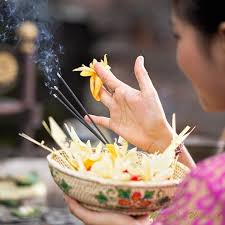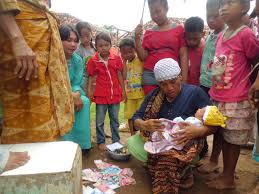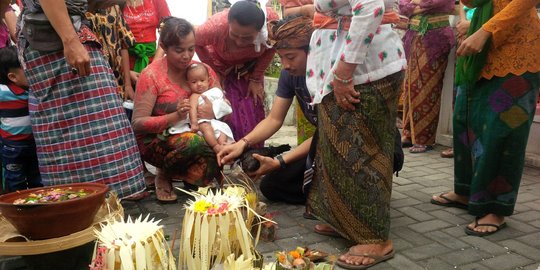Indonesia has so many unique traditions that you will not find them in another country. There is such a kind of typical tradition that happens in Indonesia. You can find so many traditions such as a wedding, building a home, and even giving names for children as the unique fact about Indonesia.
This time we will bring you into the most unique tradition in Indonesia for naming the baby born. Commonly, every parent will follow the tradition undoubtedly, but nowadays the tradition seems to vanished by modernization. That makes the naming tradition becomes rare to use from time to time.
Let’s see some of the Indonesian naming traditions that still exist until now below. Keeping the tradition can be a good thing for so many reasons. It is including keep the unique Indonesian name that you can’t find in another country.
- Caste Tradition
For some Hinduism in Bali island or other regions in Indonesia, parents keep the naming tradition for their children based on caste. Even though the caste tradition has become rare to follow, but for some reason, so many Hinduism keep it. Commonly, people outside the Sudra caste have a higher nobility as one of the facts from Hinduism in Bali.

The descendants of the Brahmana caste commonly has a name with Ida Bagus for man and Ida Ayu for the girl. For the Satria caste, their name will be Anak Agung, Cokorda, Desak, or Gusti. For the Vaisya caste, their name will be Sang, Kompyang, or Si.
For the Sudra caste, their name will follow the order of birth in the family. The firstborn will be Wayan, then the next child will be following by Putu, Gede, Made, Kadek, Nengah, Nyoman, Komang, and Ketut.
- Tasmiah
Tasmiah is a naming tradition that comes from the Banjar tribe in the south of Kalimantan. Parents will do the Aqiqah for the baby born and given the name after it in this tradition. Commonly, they will slaughter one goat for their daughter and two goats for their sons.

Before the baby brings up into the Tasmiah tradition, the parent will bring the baby to walk around the house, followed by the traditional music call as Sinoman Hadrah as a part of the ritual of religion in Indonesia. Parents also read some verses from the Quran before they launch the baby’s name.
- Ngayun
Ngayun is a naming tradition that comes from Karawang, West Java. In this tradition, the parents of the baby born will ask for the baby shaman to accompanying her in about seven days. After that, the parents will be allowed to giving the name to their baby.

In the Ngayun tradition, the baby will be tied by some sheer as protection from unwanted things in life. Parents should provide some money or jewels for the wealth and chicken feet as a health symbol such as the following story on the West Javas folktales.
- Batak Toba Tradition
Batak Toba tradition is an Indonesian naming tradition that comes from the Batak tribe in the North of Sumatera. This tradition specifically for those that live around Toba Lake and Samosir island. Commonly, in most of the Batak tribe, the tradition of naming baby born made based on the principle of the patriarchy system.
Once the baby is born, their name will be called Pranama by the parents. They will have an automatic name based on the Batak tribe as Unsok for baby boy, and Butet for baby girl. After some couple of days, based on the tradition the parents will be giving the name for their children such as Bonar, Togi, Parulian, or others name as they want.
- Noken
Noken is an Indonesian tradition that comes from Papua, specifically for people that live in Baliem Valley, Wamena that popular with the Baliem valley festival.
The tradition means that a baby who is born comes in a plain without clothes. That is why they must be wrapped in a Noken as a warm bed and have to be carried during activities.

Noken is considered a sacred custom culture in Wamena. Every woman should follow the rule, and those who ignored it will be perceived as a woman without knowing their basic custom culture.
Before the parents giving a name for their baby, the baby should be lifted daily by the Noken on the mother’s head.
- Dawan Tribe Tradition
Dawan tribe or commonly known as the Atoin Meto tribe is a tribe from Timor areas in Indonesia. They have a specific tradition of naming their children based on the principle of the patriarchy system. Just like the Batak tribe, they put their family name right on the last part after their first and middle name.
For the Dawan tribe, giving a name for their children commonly relates to some occasional events. They will give the name such as Hau, Sena, Le’u, Lupit, and many more. In another way, people also using their other family member’s names that have passed away. They believe that a baby born is a replacement for their lost one.
- Following the Family Name
In most Indonesian naming traditions, there is some typical tradition that people will be adding the family name after their first name. This tradition exists such as in the Batak tribe, Chinese tribe, Papuan tribe, and most of the Indonesian tribe in the eastern regions.
In Batak, you can find the popular family name such as Harahap, Silalahi, and many more. In Maluku, you will find some family names such as Sapulette, Tuharea, and many more.
- Sekala and Niskala Tradition
Sekala and Niskala are a Balinese Hinduism Callendar that parents usually using it to calculate some tradition in Bali includes naming tradition. The baby will have an official name after three months or about 105 days. The baby will bring into some rituals in family Pura or Merajan Pura, Paruman Pura, and villagers Pura.

So, there are some of the naming traditions that still exist in Indonesia. Are your name has already come from one of those traditions?
